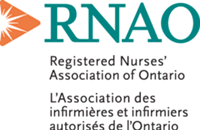Open Letter - Privatization and Outsourcing of Social Programs makes no sense, say Ontario Nurses
TORONTO, Nov. 21, 2012 /CNW/ -
Honourable Diane Finley, P.C., M.P.
Minister of Human Resources and Skills Development
House of Commons
Confederation Building
Room 707
Ottawa, ON K1A 0A6
November 21, 2012
Dear Minister,
RNAO is the professional association for registered nurses who practise in all roles and sectors in Ontario. Our mandate is to advocate for healthy public policy and for the role of registered nurses in enhancing the health of Ontarians. Nurses know that upstream policies and programs are the foundation of good health policy, good social policy and good economic policy. This includes policies and programs that advance people's right to a liveable income, security of housing and food, employment and decent working conditions, literacy and education, clean air and social inclusion.
Nurses also know that failing to address the economic and social conditions that shape people's health and create health inequities is unconscionable. Rates of poverty have increased across all age groups since the mid-1990s, including 14.5 per cent among children. About 900,000 Canadians turn to food banks for emergency food support each month - nearly 40 per cent of whom are children and youth. Four out of five women in prison are there for poverty-related crimes at an economic cost alone of $211,093 a woman. Thirteen per cent of Canadian households are considered not to have housing that is adequate, suitable or affordable. Of significance, certain groups such as persons of Aboriginal status, recent immigrants, those living in rural areas and those living on low incomes are more at risk of adverse health outcomes from social determinants such as the ones above.
Urgent action is required on the part of the federal government, but the RNAO believes strongly that your proposal to abdicate the government's responsibility in the name of "social finance" and partnering with "social entrepreneurs" is precisely the wrong policy and program prescription. Privatizing the delivery of social services as announced by you last week will lead to poorer quality and less cost-effective outcomes. Nurses oppose this idea in the strongest possible terms!
First, it is clear that the government's real agenda is to abandon the government's responsibility for those who are most vulnerable in our society. Nurses have witnessed similar disengagement by the federal government in Prime Minister Stephen Harper's irresponsible cuts to the National Aboriginal Health Organization, National Council of Welfare, and the Interim Federal Health Program.
Nurses are alarmed at the federal government attack on social and environmental programs, which is often accompanied by a hands-off approach to national programs and standards, such as the Prime Minister's refusal to participate in negotiations around renewal of the Health Accord that is due to expire in 2014. By lowering increases in funding after 2017, the government's hands-off approach threatens to undermine the publicly-funded, not-for-profit health-care system that Canadians treasure, and foster the growth of for-profit health care that will cost taxpayers more and deliver less.
Second, putting essential social programs up for tender does not work. In fact, the evidence is overwhelming that publicly-funded, not-for-profit and universally accessible social programs cost less and provide more. Experience with health care tells the story. David Himmelstein and Stephanie Woolhandler, visiting professors at Harvard Medical School and co-founders of Physicians for a National Health Program, reviewed four decades of privatization in the United States. They found "for-profit health institutions provide inferior care, excess deaths, and inflated prices." At a time when governments are looking to reduce costs, the finding that for-profit hospitals take an 18 per cent higher chunk out of the budget is sobering.
The fact is that publicly-funded, not-for-profit delivery of essential social programs is a bargain for government and a winner for the public.
While the research evidence demonstrating a correlation between publicly-funded, not-for-profit, better outcomes and lower costs is clear, nurses do not suggest that the system can't be improved. In fact, it must be transformed in significant ways. It is critical that the government of Canada address key social and environmental determinants of health, starting with implementation of recommendations of the Standing Committee on Social Affairs, Science, and Technology's In From the Margins: A Call to Action on Poverty, Housing, and Homelessness.
Of the 74 recommendations, the first is that the federal government "adopt a core poverty eradication goal of lifting people out of poverty." Key recommendations include the development of an integrated national housing and homelessness strategy, identification of improvements needed to the Employment Insurance program, addressing over-representation of Aboriginal peoples and newcomers living in poverty, recognizing health impacts of poverty, including the need for a national pharmacare program, and the importance of a rights-based approach to poverty. These and more systemic and clinical innovations can and must be made across health and social service sectors. Those are the kinds of "innovations" Canadians including nurses want.
Replicating the failed experiments of other jurisdictions with for-profit, privately-delivered social programs is irresponsible and represents a giant step backward. Why would the government consider privatizing social services? It defies logic. And it goes against any notion of good government as being about ensuring all persons have the same rights and that principles of equity, fairness and respect are applied evenly.
Canadians want cost-effective public services that deliver the best outcomes; they do not want to outsource or sell our social programs to the lowest bidder to make profits. Publicly-funded, not-for-profit public services that put people, not profits, first - now THAT's a good idea!
Warm regards,
(Signed)
Doris Grinspun, RN, MSN, PhD, LLD(hon), O.ONT.
Chief Executive Officer, RNAO
(Signed)
Rhonda Seidman-Carlson, RN, MN
President, RNAO
Cc: All MPs and MPPs
SOURCE: Registered Nurses' Association of Ontario
For more information about RNAO and its letter to Minister Finley, please contact:
Marion Zych
Director of Communications
Registered Nurses' Association of Ontario (RNAO)
416-408-5605 (office)
647-406-5605 (cellular)
www.rnao.ca

Share this article